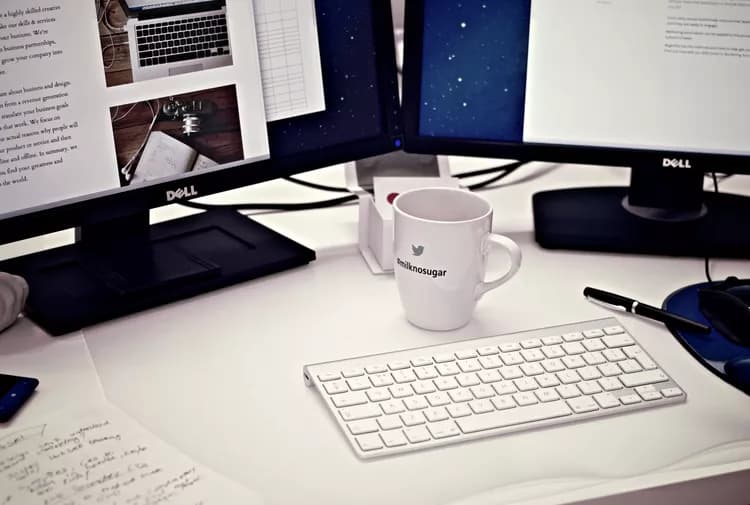
3 Scientific Ways To Enhance Your Health And Productivity At Work
Sitting at your desk for extensive periods can be deadly. Correlational studies show a strong relationship between sitting too much and health concerns, including obesity, cancer, poor blood circulation, joint pain, and heart disease. After just one hour of sitting, the blood can flow up to 50 percent more sluggish. In addition, spending hours at the gym does not seem to offset the negative associations of sitting too much. New evidence by a cardiologist at UT Southwestern proposes that two hours of inactivity can be just as harmful as 20 minutes of physical activity is beneficial.
The Physical Activity Guidelines for Americans recommends that adults get at least 150 minutes of moderate-intensity aerobic activity each week, such as walking or 75 minutes of vigorous activity per week. There are easy, scientifically proven ways to help improve your heart’s health. Here are three quick, scientific ways to improve your health and productivity at work.
1. Take a quick walk every hour.
A study from Indiana University published in Medicine & Science in Sports & Exercise advocates that taking several five-minute walking breaks can reverse impaired blood flow in leg arteries caused by sitting for extended periods. Those who walked for five minutes every hour did not have blood flow impairment. Get up for a quick water break and check up on co-workers.
2. Hold a walking meeting.
Who said all meetings have to be in the conference room? Walk with co-workers to increase blood flow in your body and maintain brain function. Steve Jobs, the late founder of Apple, Jack Dorsey of Twitter, and Facebook's Mark Zuckerberg have all been known to support walking meetings. Holding meetings on foot can even boost creative inspiration as well as protect the brain and heart. A study by Stanford researchers found that walking indoors or outdoors increases creativity in the office.
3. Try a standing desk once in a while.
Various studies have compared the health effects of using a sitting desk versus using a standing desk. Reports show that a standing desk can help an individual burn more calories, have healthier veins, and reduce the risk of metabolic disorders, such as diabetes and heart disease, than if they were using a sitting desk.Reports show that a standing desk can help an individual burn more calories, have healthier veins, and reduce the risk of metabolic disorders, such as diabetes and heart disease, than if they were using a sitting desk.
Some people’s only opportunity to engage in physical activity is at work. Finding excuses to keep moving can protect your health and even inspire novel ideas and help your business grow!
References:
Buckley, J. P., Mellor, D. D., Morris, M., & Joseph, F. (2013). Standing-based office work shows encouraging signs of attenuating post-prandial glycaemic excursion. Occupational and environmental medicine, oemed-2013.
Haslam, C., Haslam, R., Clemes, S., Kazi, A., Duncan, M., Twumasi, R., & Kerr, L. (2012, September). Working Late: strategies to enhance productive and healthy environments for the older workforce. InWorking Late: strategies to enhance productive and healthy environments for the older workforce. In Proceedings of the Human Factors and Ergonomics Society Annual Meeting (Vol. 56, No. 1, pp. 140-143). Sage Publications.
Healy, G. N., Dunstan, D. W., Salmon, J., Cerin, E., Shaw, J. E., Zimmet, P. Z., & Owen, N. (2008). Breaks in sedentary time beneficial associations with metabolic risk.Owen, N. (2008). Breaks in sedentary time beneficial associations with metabolic risk. Diabetes care, 31(4), 661-666.
Kulinski, J. P., Khera, A., Ayers, C. R., Das, S. R., de Lemos, J. A., Blair, S. N., & Berry, J. D. (2014, August). Association between cardiorespiratory fitness and accelerometer-derived physical activity and sedentary time in the general population. In Mayo Clinic Proceedings (Vol. 89, No. 8, pp. 1063-1071). Elsevier.
Matthews, C. E., George, S. M., Moore, S. C., Bowles, H. R., Blair, A., Park, Y., ... & Schatzkin, A. (2012). Amount of time spent in sedentary behaviors and cause-specific mortality in US adults. The American journal of clinical nutrition, ajcn-019620.
Oppezzo, M., & Schwartz, D. L. (2014). Give your ideas some legs: The positive effect of walking on creative thinking.Give your ideas some legs: The positive effect of walking on creative thinking.
Thosar, S. S., Bielko, S. L., Mather, K. J., Johnston, J. D., & Wallace, J. P. (2014). Effect of Prolonged Sitting and Breaks in Sitting Time on Endothelial Function. Medicine and science in sports and exercise.
Tüchsen, F., Hannerz, H., Burr, H., & Krause, N. (2005). Prolonged standing at work and hospitalisation due to varicose veins: a 12 year prospective study of the Danish population. Occupational and environmental medicine, 62(12), 847-850.
Related Articles
Test Your Knowledge
Asked by users
Related Centers
Related Specialties
Related Physicians
Related Procedures
Related Resources
Join DoveHubs
and connect with fellow professionals

0 Comments
Please log in to post a comment.